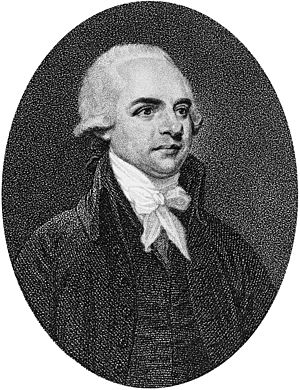Thomas Trotter (physician) facts for kids
Thomas Trotter (born 1760, died 1832) was a Scottish doctor who worked for the Royal Navy. He was a big supporter of improving medical care in the Navy. He also strongly spoke out against the slave trade. Trotter was born in Melrose, Roxburghshire, Scotland. He studied medicine in Edinburgh.
His most important book, Medicina Nautica, came out in 1802. It gave a detailed look at naval medicine during the French Revolutionary Wars. Trotter believed in vaccinations. As the Navy's main doctor, he made sure all naval surgeons got vaccinated against smallpox. After a long career, he retired in 1802 and passed away in 1832.
Contents
Thomas Trotter's Life and Career
Trotter was born in Roxburghshire in 1760. When he was 19, he joined the Royal Navy. Even though he didn't have much medical training, he became a surgeon's mate. This meant he helped the main doctor on a large warship called HMS Berwick.
Britain was fighting wars against the Dutch, French, and Spanish at this time. Trotter was part of important battles, like the Battle of Dogger Bank in 1781. He also helped during the lifting of the Great Siege of Gibraltar in 1782. He left the Navy in 1783 when the wars ended.
A Change of Heart: Fighting Slavery
After leaving the Navy, Trotter couldn't find work. He decided to become a surgeon on a "Guineaman," which was a ship that transported enslaved people from Africa to the Caribbean. He later said this was the worst time of his life. Seeing the terrible suffering of the enslaved people made him a strong supporter of the anti-slavery cause. He also saw many sailors get sick with scurvy, which made him want to study that disease.
Trotter went back to school in Edinburgh. He earned his medical degree (M.D.) in 1788. In 1790, he rejoined the Navy as a surgeon on HMS Royal William. In 1793, he sailed to the West Indies on HMS Vengeance.
By 1794, he became a main doctor for the Channel fleet. He was present at the battle of 1 June 1794. He continued to serve at sea until an accident made him unable to continue. He then received a pension and started a private medical practice in Newcastle. He continued to write about medical topics. Thomas Trotter died in Newcastle on September 5, 1832.
Thomas Trotter's Important Writings
Trotter started writing at a young age. His first poems were published when he was 16. His medical degree paper was about the effects of drunkenness. He later published it as An Essay... on Drunkenness in 1804.
While working as a private doctor, he wrote about scurvy. His book, Observations on the Scurvy, came out in 1786. He confirmed what another doctor, James Lind, had found earlier. Lind showed that citrus fruits could prevent scurvy. Thanks to doctors like Trotter, the Navy started using lemon juice to prevent scurvy in 1795.
Here are some of his other important works:
- A Review of the Medical Department in the British Navy (1790) – This book suggested ways to improve Navy medical care.
- Medical and Chemical Essays (1795) – This included more observations on scurvy.
- Medicina Nautica: an Essay on the Diseases of Seamen (published in three parts: 1797, 1799, 1803) – This was his major work on diseases affecting sailors.
- A Proposal for destroying the Fire and Choak Damps of Coal Mines (1805) – This book suggested ways to make coal mines safer.
- A View of the Nervous Temperament (1807) – This was a guide to understanding nervous and stomach problems.
- A practicable Plan for Manning the Royal Navy... without Impressment (1819) – This book suggested ways to get sailors for the Navy without forcing them to join.
- Sea Weeds: Poems written on various occasions (1829) – A collection of his poems.
Trotter also wrote articles for different magazines and journals.
 | Janet Taylor Pickett |
 | Synthia Saint James |
 | Howardena Pindell |
 | Faith Ringgold |


